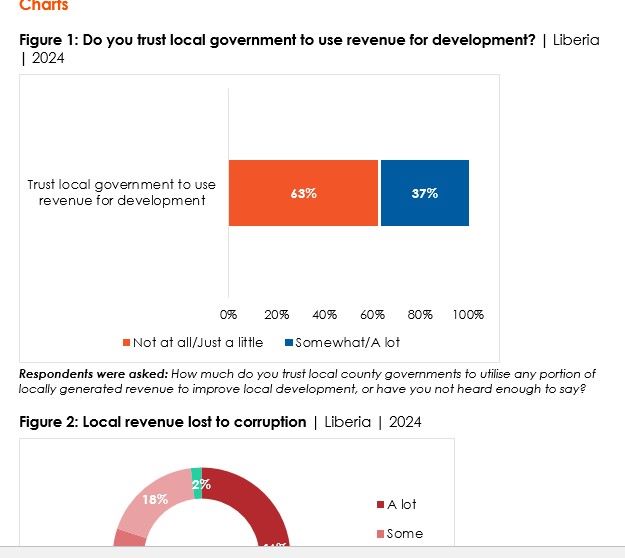A large majority of Liberians express a lack of trust in their local government authorities to manage locally generated revenues effectively, according to the latest Afrobarometer survey.
The findings also highlight widespread concerns about corruption, with an overwhelming majority saying that local resources given to county government are likely to be lost to graft.
In line with these concerns, a majority believe that letting voters elect county superintendents could boost citizen participation and enhance accountability. Even so, a slim majority favour the current system of superintendents appointed by the president.
Key findings
- Almost two-thirds (63%) of Liberians express little or no trust in their local county governments to utilise locally generated revenue to improve local development (Figure 1).
- Eight in 10 citizens say that “a lot” (46%) or “some” (34%) of the revenues provided to county governments from local resources will be lost through corruption (Figure 2).
- Three-quarters (76%) of Liberians “agree” or “strongly agree” that counties should keep part of local revenues for development (Figure 3).
- Seven in 10 respondents say that allowing voters to elect county superintendents will boost participation in local governance (71%) and increase accountability (71%).
- However, more than half (56%) maintain that the current system of county superintendents appointed by the president has served the country well.
Afrobarometer surveys
Afrobarometer is a pan-African, non-partisan survey research network that provides reliable data on African experiences and evaluations of democracy, governance, and quality of life. Nine survey rounds in up to 42 countries have been completed since 1999. Round 10 were launched in January 2024. Afrobarometer’s national partners conduct face-to-face interviews in the language of the respondent’s choice.
The Afrobarometer team in Liberia, led by the Center for Democratic Governance (CDG), interviewed a nationally representative sample of 1,200 adult citizens between 30 July to 21 August 2024. A sample of this size yields country-level results with a margin of error of +/-3 percentage points at a 95% confidence level. Previous surveys were conducted in Liberia in 2008, 2012, 2015, 2018, 2020, and 2022.

